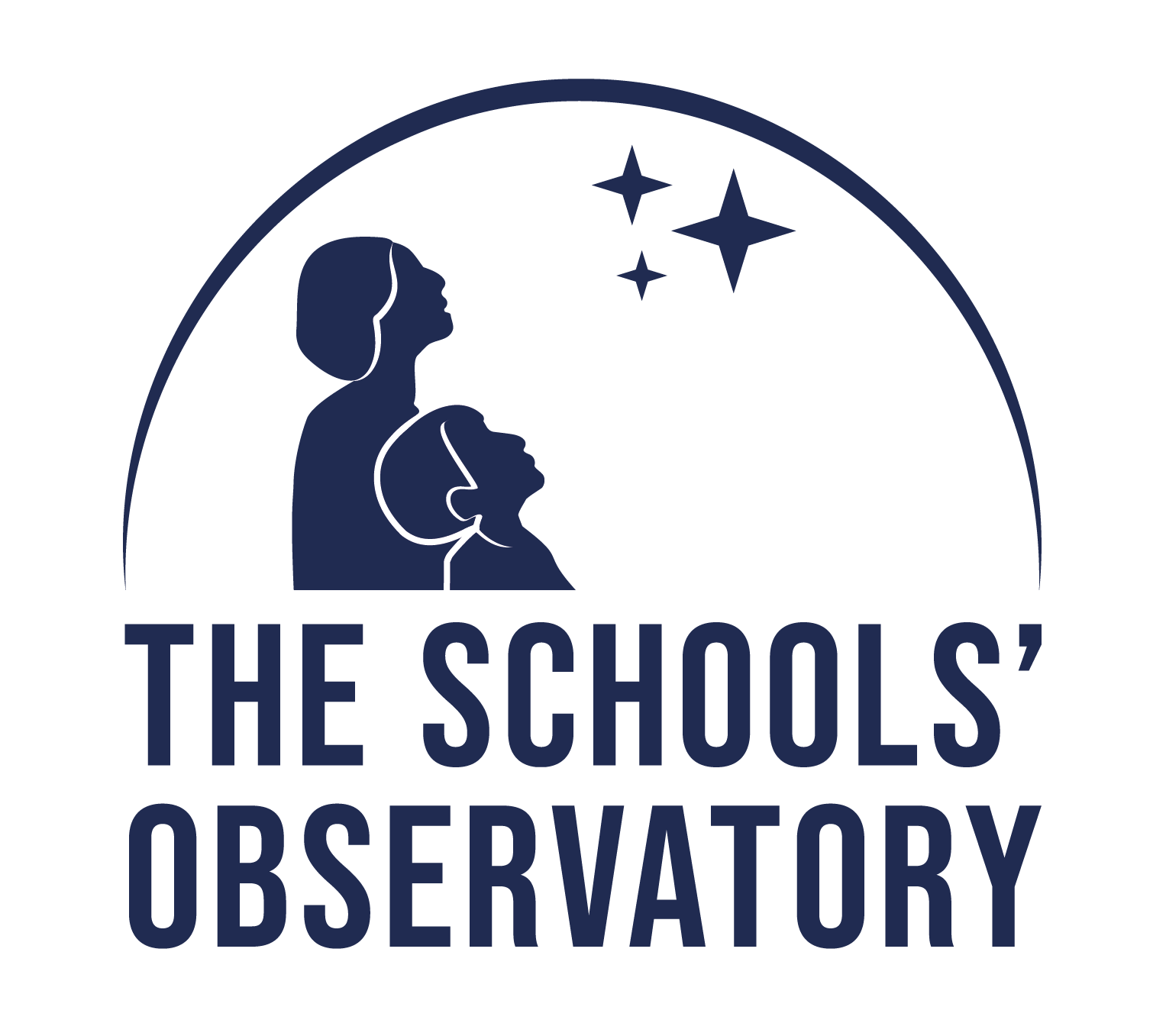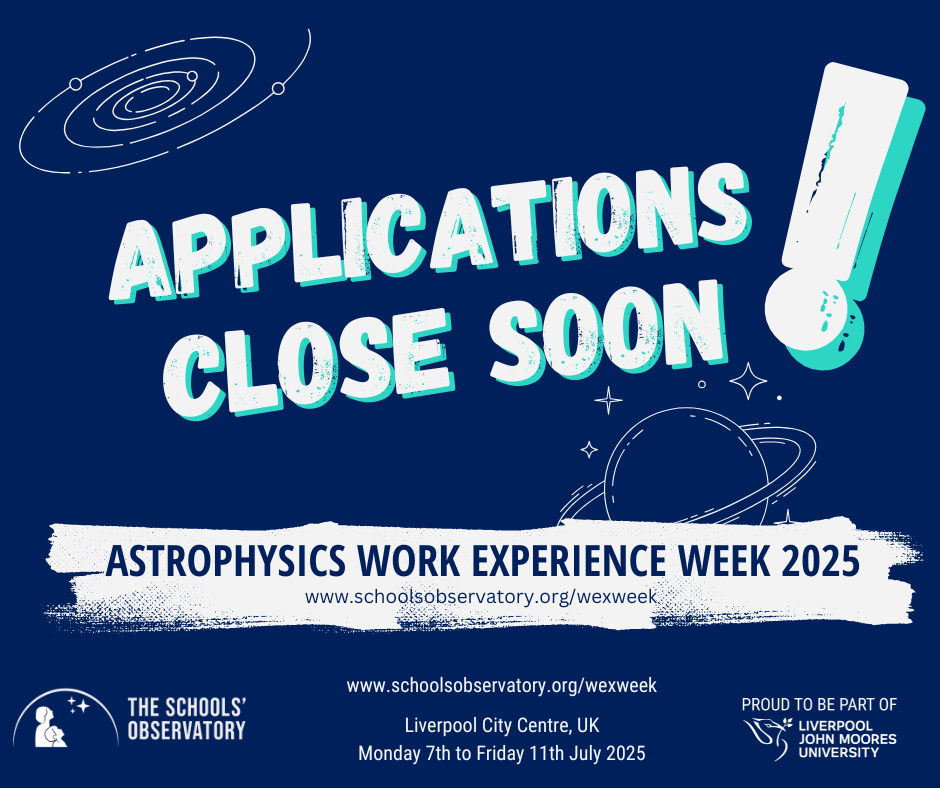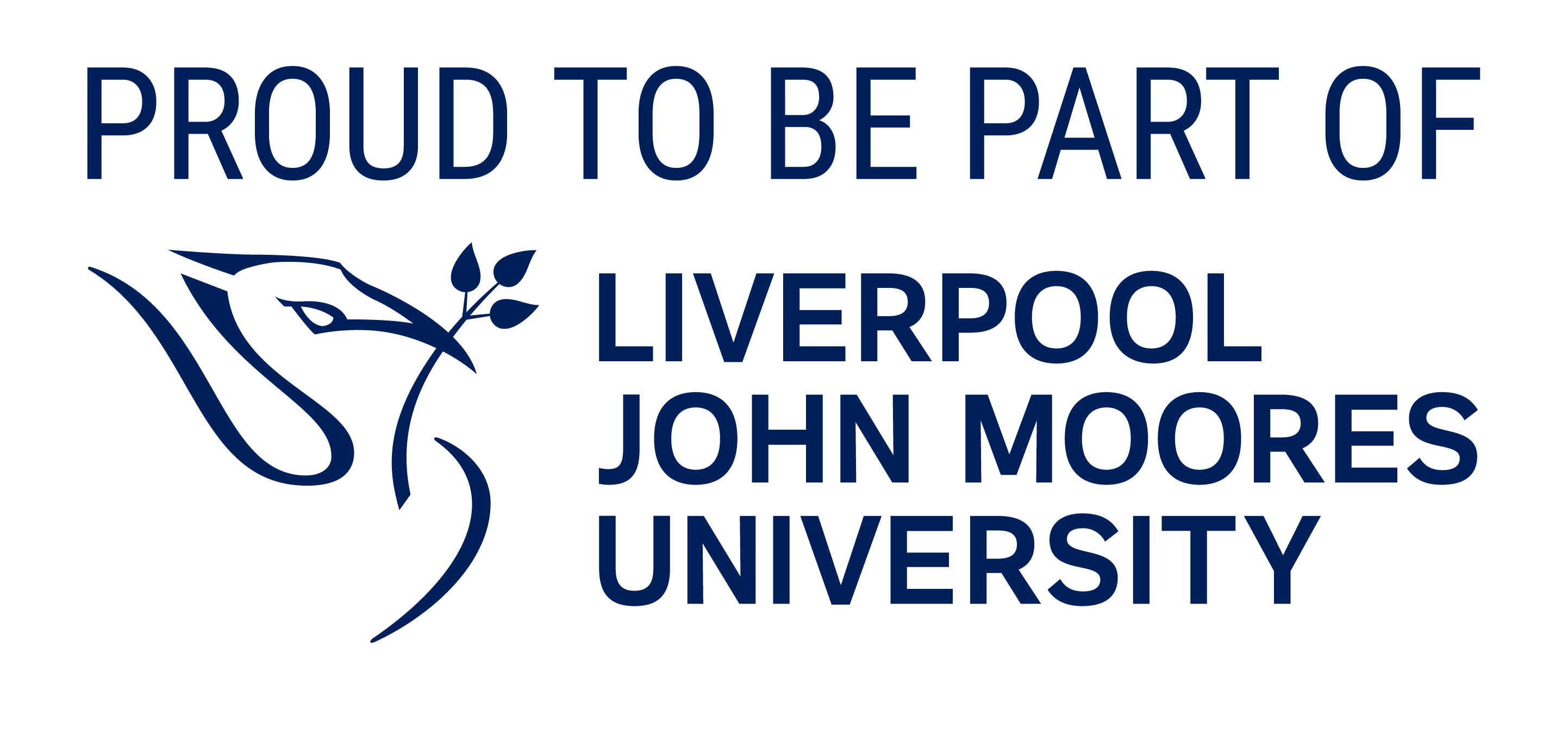
The Schools' Observatory News
April 2025
![]()
Our Place in Space Course - Temporary Progress Reset
If you have started Our Place in Space Course, please be aware that the course will be updated from Monday 14th April. We are making these changes in response to the valuable feedback we’ve received, to improve the experience for educators.
As part of this update, all users will lose their saved progress after this date. We apologise for any inconvenience this may cause and appreciate your understanding as we work to enhance the course.
Have you already completed the course? If so, and you have interacted with all the material, you can request your certificate by emailing SchoolsObs@ljmu.ac.uk. Please include the following:
- Your username (shown at the top of your screen).
- Your name as you would like it to appear on your certificate.
If you have any questions or further feedback, please do get in touch. We are always happy to hear from you.
![]()
International Day of Human Space Flight
Every year on 12th April, we celebrate the International Day of Human Space Flight, marking the moment in 1961 when Yuri Gagarin became the first human to travel into space. His historic journey opened the door to decades of exploration, innovation, and discovery.
This day is a chance to reflect on how far we have come and to spark conversations about where we might go next.
Why not explore past missions and the future of space travel with your students?
- Let’s Explore Astronauts – What is life like for astronauts, and what skills do they need?
- Host a Space Debate – Get your class discussing big ideas like space tourism and human settlements on other planets.
- Read All About It – Man on the Moon – Explore how the Moon landing was shared with the world through newspapers.
- Timeline of Apollo Missions – Follow the major milestones of human space exploration.
Celebrate the spirit of discovery that launched us into space and inspire your students to imagine what the next giant leap might be.
![]()
World Art Day: Celebrate Space Through Creativity!
15th April marks World Art Day, a celebration of creativity and expression. It is also a great opportunity to explore how art and astronomy can come together, whether through drawing galaxies, sculpting planets, or imagining new worlds.
Why not try one of our art-inspired activities?
- Colour Your Space – Use your imagination to colour stunning images from space and make them your own.
- Design a Planet – Create your own world, decide its size, temperature, number of moons, and even invent the life forms that could live there.
- Make a Play-doh Solar System – Get hands-on with this creative task and bring our Solar System to life with modelling dough.
From visual storytelling to scientific sketching, astronomy has long inspired artists. Let your students celebrate the universe with curiosity and creativity this World Art Day! ![]()
Earth Day: Protecting Our Planet!
22nd April is Earth Day, a global reminder of the need to care for our planet. It is also a chance to reflect on how protecting Earth helps us better explore and understand the universe.
From reducing light pollution to promoting sustainable living, small actions can make a big difference. Dark skies not only benefit wildlife and ecosystems, but they also allow us to see more of the stars.
Explore these activities with your students to think about Earth’s unique place in the cosmos:
- What Does Life Need? – Discover what makes Earth the perfect home for life and whether other planets could support it.
- Hot, Cold, or Just Right – Investigate how a planet’s distance from its star affects its ability to support life.
- Life on Earth – Learn how different environments on Earth support different life forms, and what that tells us about the search for life elsewhere.
This Earth Day, celebrate the delicate balance that makes life on our planet possible and think about how we can protect it for future generations of skywatchers.
![]()
New 'Things To Do' Resources
We have added some exciting new resources to our Things To Do section, covering two fascinating topics: galaxies and tides. These resources are designed to support learning through curiosity, observation, and investigation.
Explore our new Things To Do resources:
What is a Galaxy? – Learn what galaxies are, what they are made of, and how we classify them.
Classify Galaxies – Use real images to explore how astronomers group galaxies based on their shapes.
Explore Our Galactic Neighbourhood – Discover the galaxies closest to the Milky Way and how they interact with each other.
Explore Tides – Find out what causes tides on Earth and how the Moon and Sun play a role.
Investigate Tides – Use real data to spot patterns in tides and understand their links to the lunar cycle.
Kepler's Laws: Habitable Zones – You will use Johannes Kepler’s Laws of planetary motion to calculate the orbital distance of each exoplanet in the TRAPPIST-1 star system.
These new resources are ready to use in the classroom or at home–no telescope required!
![]()
Look to the Sky!
Plan your stargazing adventures with our April astronomy calendar! Download it to display at home or in the classroom. Get ready for an exciting month of celestial events, including the Lyrid Meteor Shower, Mercury at its highest altitude and conjunctions between the Moon and some of the Solar System’s most impressive planets. Don’t miss out on what the night sky has to offer!
Download and display April's astronomy calendar!

![]()
UK and Ireland based: Astrophysics Work Experience Week 2025
Applications for our Astrophysics Work Experience Week 2025 will close at 12:00 noon on Tuesday, 22nd April. There is still time to apply!
This non-residential opportunity is open to Year 12 students (or equivalent) across the UK and Ireland and will run from Monday 7th to Friday 11th July 2025.
Students from across the UK and Ireland are welcome, but you will need to arrange your own accommodation. We particularly encourage applications from students in the Liverpool City Region.
Visit our Work Experience Week page for more details and the link to the application form.
If you have any questions about the application process, email us at SchoolsObs@ljmu.ac.uk during office hours. We look forward to welcoming the next generation of astrophysicists!

![]()



